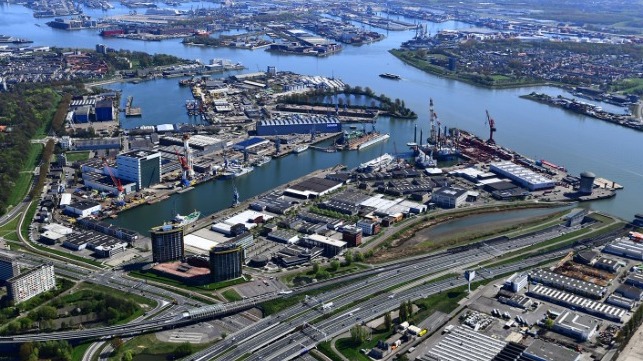EU Green Port Project Explores New Fuels, Digitization, and Automation

An international alliance of 45 companies, research institutes, and port authorities, headed by the Port of Rotterdam Authority, has received EU funding for a new project focusing on the greening of port operations. The consortium will be using this grant to execute 10 pilot projects and demonstration projects that focus on sustainable and smart logistics in port operations.
The European Commission is providing nearly $30 million in research grants for the efforts to look at a broad range of initiatives within the green port project. The consortium’s broad, international research program primarily focuses on aspects in the use of new fuels and energy carriers that have not yet been tested in practice. This includes production, transport, storage, distribution (fuels), and charging (electric power).
In announcing the new project, the Port of Rotterdam said that several renewable fuels and energy carriers are currently being developed further, including green hydrogen, large electric batteries, ammonia, and bio-LNG. Each of these has its advantages and challenges, with one option seeming more suited to shipping, another to applications within the port, or transport to inland destinations. Some links in the chain from production to consumption have already been tested while others have not.
Examples include the operation of an electric battery-powered locomotive that uses power from an overhead line for both motive power and for recharging its battery. The concept is that this would allow the locomotive to work in areas that lack an overhead line such as marshaling yards. Other examples include bunkering ammonia as a transport fuel, or electrical power from shore for ships moored offshore to a mooring buoy.
The partners will also design and implement several digitalization and automation solutions in the context of the energy transition. In addition, they will be exploring how best to encourage companies to raise the sustainability of their logistics processes.
One of the results from the consortium will involve the development of a master plan that sets out how transport in, to, and from the ports can be made carbon-free by 2050. They will also explore what needs to be done before 2030 and 2040 to achieve the carbon-free goal. The results of the various pilot projects and studies will be shared with other European ports, knowledge institutes, and companies.

that matters most
Get the latest maritime news delivered to your inbox daily.
The project comes out of a collaboration between the port authorities of Rotterdam, DeltaPort (Germany), HAROPA PORT (France) and Sines (Portugal), in partnership with 10 research institutes and over 30 companies in the Netherlands, Germany, France, Portugal, Denmark, and Sweden. The research project has been given the acronym MAGPIE: sMArt Green Ports as Integrated Efficient multimodal hubs.
The research project will run for five years. The initial funding is being with within the Horizon 2020 green deal program.
